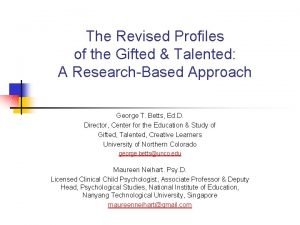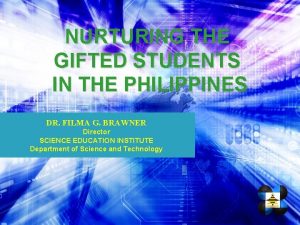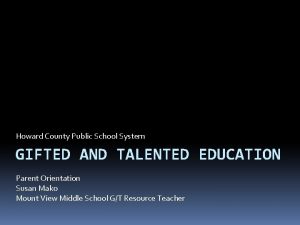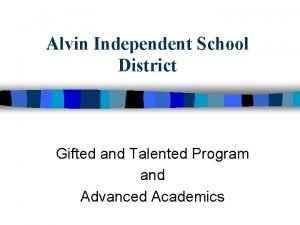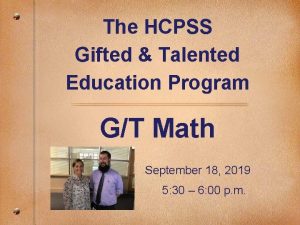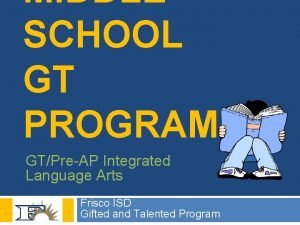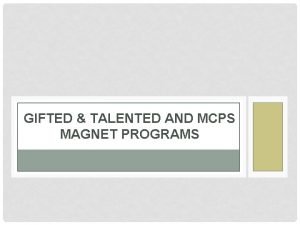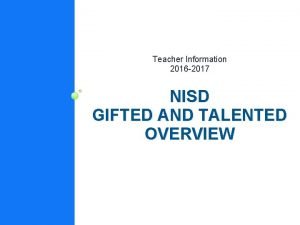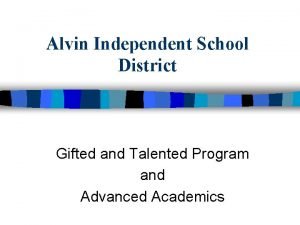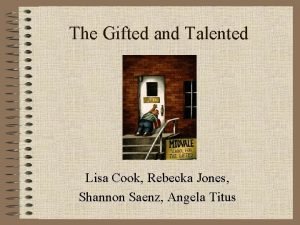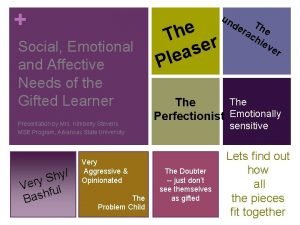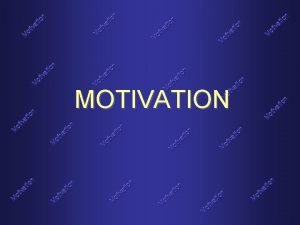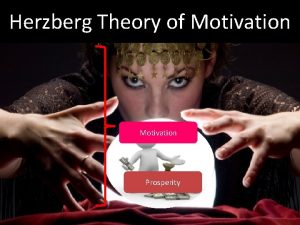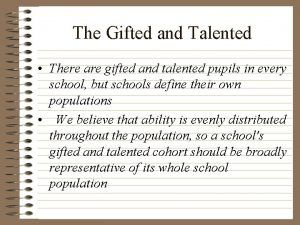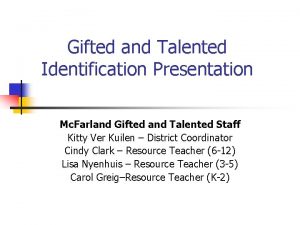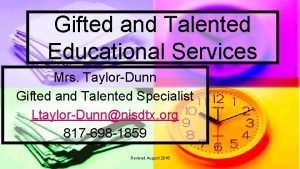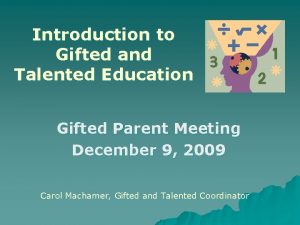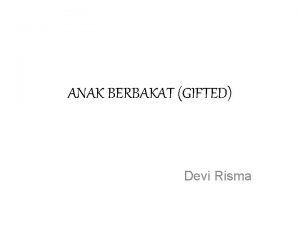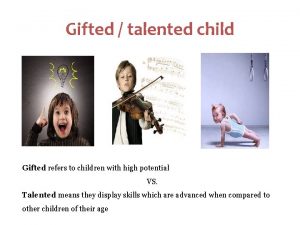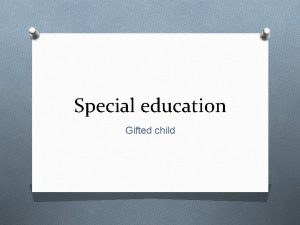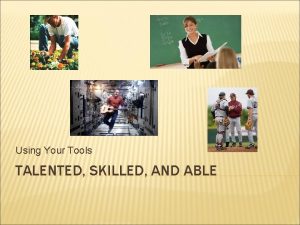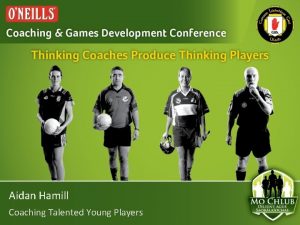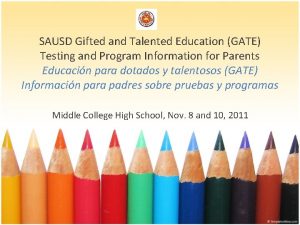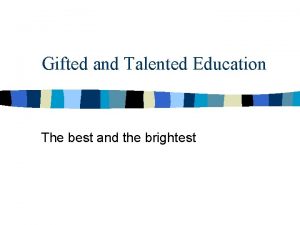The Nature and Needs of Gifted and Talented














- Slides: 14

The Nature and Needs of Gifted and Talented Students in the Early Years of Schooling Rosalind Walsh Children and Families Research Centre Institute of Early Childhood Macquarie University 1

2

Thinking back to the child/ren you are working with, what are some of the characteristics of young gifted children that you have observed? 3

Characteristics of young gifted children • • Learn quickly and easily Excellent memory Heightened level of curiosity (obsessive fascination) Wide range of interests Long attention span Ability to handle abstract ideas Independent Advanced play interests 4

Characteristics of young gifted children • • • High level of personal responsibility Strong feelings and opinions Advanced levels of moral development Sense of humour Superior vocabulary Advanced reading ability Single-mindedness High levels of energy Preference for unusual, original, creative responses 5

Characteristic Possible Negative Classroom Behaviour Some Classroom Needs Heightened levels of curiosity and a wide variety of interests Takes on too much; poor group participant; asks inappropriate questions; easily diverted from task Exposure to a variety of subjects; opportunities to pursue individual interests; learning centres Long attention span Dislikes interruptions and disruptive routines Long-term projects; IEPs Ability to handle abstract ideas Questions other decisions and may be seen as disrespectful Multidisciplinary units of work; theme-based work; higher levels of problemsolving Alert and subtle sense of humour May use humour at others’ Opportunities to examine expense humour in positive and negative situations Superior vocabulary and verbal ability May be “bossy” and influence other students Foreign language studies; vocabulary-building exercises Gross et al. 2003 6

Characteristic Possible Negative Classroom Behaviour Some Classroom Needs Independent Avoids discussions and group work; dislikes working with others; is uncooperative in group situations Independent study projects; find like-minded peers to work with Advanced levels of moral development Isolates self from peer group; frustration when attempting “reforms” Exposure to other viewpoints; problem solving activities in the affective domain Preference for original, creative and unusual responses Asks impertinent Mentoring; acceleration questions; does not accept the status quo; is disorganised and absentminded; find decision making difficult. High level of energy Appears to be hyperactive; Needs alternating stimulus seeking; easily activities requiring bored without challenge intellectual and creative stimulation with routine tasks 7 Gross et al. 2003

8

9

Needs of young gifted children • • • “Complexity and Connection” Support for abilities Opportunities to take risks/make mistakes Opportunities to mix with “like minds” Teaching that focuses on a “strengths” model 10

Three Fundamental Differences 1. The capacity to learn at faster rates 2. The capacity to find, solve and act on problems more easily 3. The capacity to manipulate abstract ideas and make connections (Van. Tassel-Baska, 1988) 11

1. 2. 3. 4. 5. All learners should be provided with curriculum opportunities that allow them to attain optimal levels of learning. Gifted learners have different learning needs compared with typical learners. Therefore, curriculum must be adapted or designed to accommodate these needs. The needs of gifted learners cut across cognitive, affective, social and aesthetic areas of curriculum experiences. Gifted learners are best served by a confluent approach that allows for both accelerated and enriched learning. Curriculum experiences for gifted learners need to be carefully planned, written down, implemented, and evaluated in order to maximise potential effect. (Van. Tassel-Baska, 1996, p. 126) 12

Contact/Further Questions Rosalind Walsh Email: rosalindlee. walsh@students. mq. edu. au 13

Teachers and precocious readers • Burns et al. (1991) – when early readers not challenged their achievement scores regress • Chall (2000) – teachers tend to give on-grade enrichment, rather than more challenging material • Stainthorp & Hughes (2004) – precocious readers maintained advantage, but school experiences did not appear to have added any value. • Early readers, tend over time to remain good readers (Jackson, 1992) 14
 Revised profiles of the gifted and talented
Revised profiles of the gifted and talented The gifted philippines
The gifted philippines Howard county gifted and talented
Howard county gifted and talented Alvin isd gifted and talented
Alvin isd gifted and talented Hcpss 4th grade math
Hcpss 4th grade math Frisco gifted program preparation
Frisco gifted program preparation Howard county gifted and talented
Howard county gifted and talented Http//bit.ly/mcps-parentinput
Http//bit.ly/mcps-parentinput The anderson school gifted and talented nyc
The anderson school gifted and talented nyc Nisd gifted and talented program
Nisd gifted and talented program Alvin isd gifted and talented
Alvin isd gifted and talented Gifted vs talented
Gifted vs talented Affective needs of gifted students
Affective needs of gifted students Primary needs and secondary needs
Primary needs and secondary needs Primary needs and secondary needs
Primary needs and secondary needs
